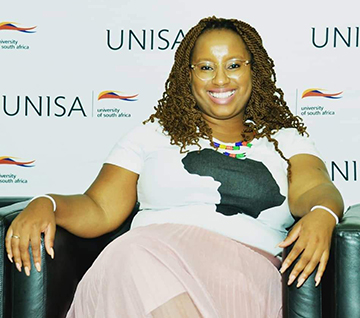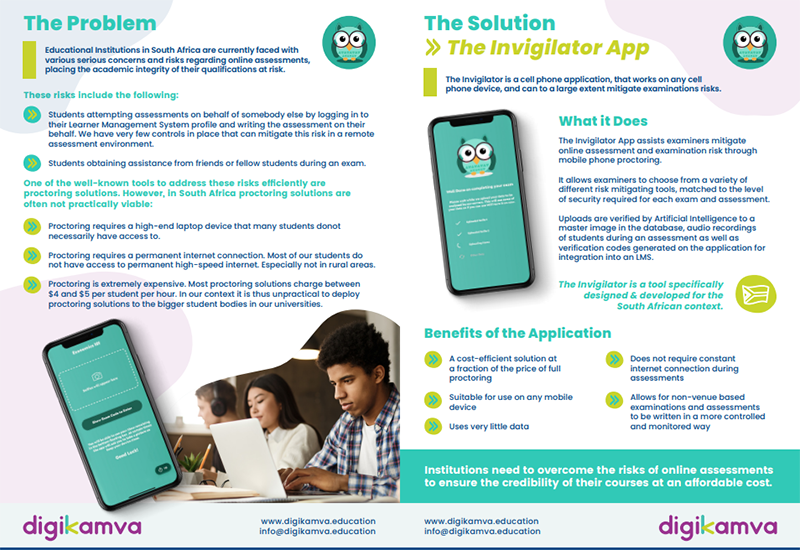News & Events
Safeguarding the academic integrity of Unisa’s examinations

Phindiwe Kamolane
Unisa now uses the Digikamva Invigilator App to invigilate examinations remotely. According to Phindiwe Kamolane, Chair of the Online Examination Committee, Unisa implemented the Invigilator App to protect the integrity of Unisa’s assessments.
“We previously had physical invigilators who assured the authenticity of the student writing examination and prevented the use of unapproved material or notes in the examination venues,” says Kamolane. “The Covid-19 pandemic accelerated implementation of Unisa’s Online Strategy and as a result Unisa administered its examinations online from the May/June 2020 examination sitting. Online examinations equally require invigilation to maintain the integrity of assessment by verifying student’s identification. The Invigilator App is intended to be a deterrent and detection tool that prevents and detects instances of examination misconduct through identification of students’ dishonest behaviour during their examination sitting. It thus assists in protecting the integrity of Unisa’s qualifications utilised for future employment of its graduates. It was important for the institution to introduce an invigilation tool that caters for unique South African socio-economic factors. Students are able to access their Invigilator App on their cell phones and there are currently five universities using this particular app in South Africa.”
The Invigilator App was first piloted in the October/November 2020 examinations. Unisa continued utilising the app for its subsequent examinations. The full rollout of Unisa exit modules has been planned for its October/November 2021 examination sitting. Exit modules refer to those modules that feed into higher certificates, diplomas, degrees, postgraduate diplomas and honours programmes. Full implementation for the remaining modules is scheduled for next year.
The Invigilator App consists of the following features that ensure assessment integrity and authenticity of students writing examinations:
Student authentication – Photo selfies
Students are expected to take a master selfie when they register on the app. Using artificial intelligence, the facial recognition software verifies any future photos with the original master photo. As the student completes the assessment, he or she will receive random notifications to take a selfie. This selfie is then matched to the master photo, to ensure the person who is completing the assessment is in fact the student.
Extra photos
The lecturer can also set up their assessment to take a number of extra photos. These extra photos assist in verifying the student identification and comparing the answer scripts submitted on the official Unisa platforms to what was submitted on the application.
- Students are expected to take a photo of their ID or their driving licence as randomly prompted by the app.
- Students are expected to take photos of their scripts as randomly prompted by the app.
- Students are expected to take a photo of their complete answer script at the end of the assessment time.
Audio recordings
The lecturer sets up the assessment to take a number of random audio recordings during the course of the assessment. These audio recordings are analysed by the Invigilator App’s system to check if there was any talking during the assessment.
Out of app time
The Invigilator App logs when a student exits the app during their invigilated examination session. Students who are out of app for extended period of time might be engaging in other suspicious activity as there’s an expectation that students must be fully engaged on their invigilated examination and not be distracted by other cellphone activities requiring them to leave their invigilated session.
GPS tracking
The Invigilator App tracks students who work in close vicinity of each other.
The above activities are considered in totality in determining whether students did display suspicious behaviour. The Invigilator App has successfully identified students who have transgressed examination rules. In some cases, this has resulted in the suspension of students identified from the university.

Another invigilation tool used in the university is IRIS proctoring tool, but it is only utilised in the College of Science, Engineering and Technology. IRIS, unlike the Invigilator App, uses a student’s webcam that can only be accessed through a laptop.
The university also relies on external markers to highlight where similarity in students’ responses have been identified. Markers are able to flag such students on the online marking tool. After each examination, a module disciplinary report is submitted to the Disciplinary Office for initiation of formal disciplinary proceedings against students who have been suspected of examination misconduct.
Asked about plans to expand the functionality and/or use of the app going forward, Kamolane says: “We will continue using the current invigilation tools and detection methods. The university is migrating to a new learning management system, Moodle in 2022, which will include invigilation functionalities. The university is, however, currently considering developing its own invigilation tool in the medium term.”
*By Lesego Chiloane-Ravhudzulo, Journalist, Department of Institutional Advancement
Publish date: 2021-10-20 00:00:00.0

